 |
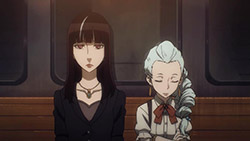 |
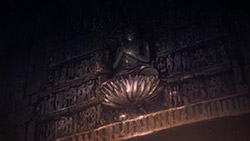 |
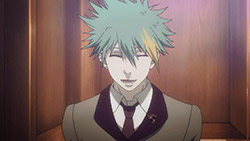 |
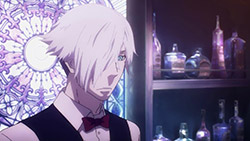 |
 |
 |
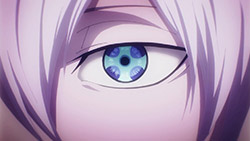 |
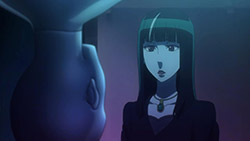 |
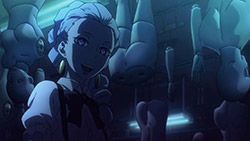 |
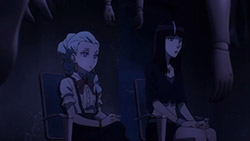 |
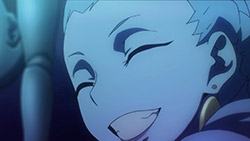 |
 |
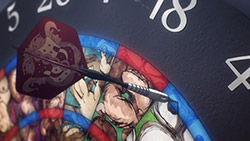 |
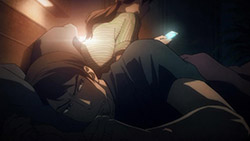 |
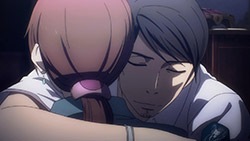 |
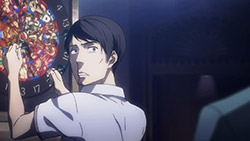 |
 |
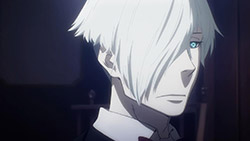 |
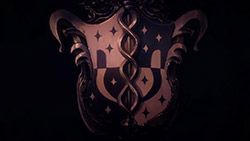 |
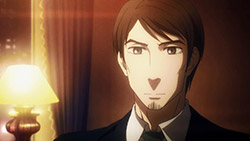 |
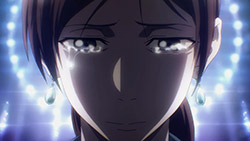 |
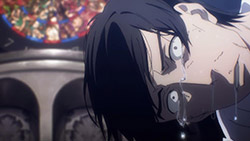 |
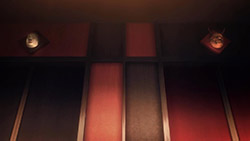 |
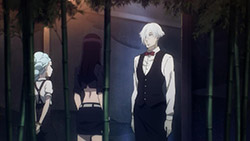 |
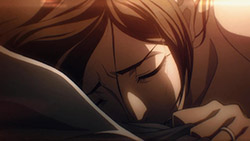 |
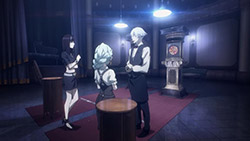 |
 |
 |
 |
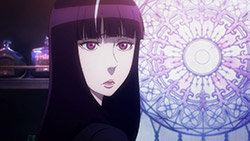 |
 |
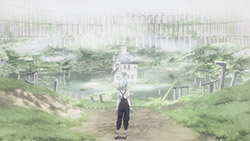 |
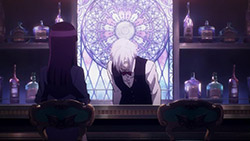 |
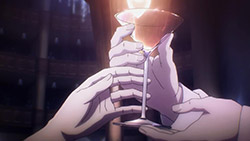 |
 |
「デス・リバース」 (Desu Ribaasu)
“Death Reverse”
This week offers a bit more context to last week’s premiere and also provides some answers for those that were debating last week. What I like about this week’s episode (and actually, I like this method of storytelling in general) is that it takes a step back to explain what went on behind the scenes of Machiko and Takashi’s game. The show didn’t bother introducing a new pair of people to judge so there’s isn’t too much information bombarded on the audience at once and yet, there’s still plenty of new material to grasp what’s going on in purgatory. Ginta Nona (Okubo Rumi) introduces herself to “Nameless Girl” (Seto Asami) and she gives her a job as the assistant to Decim within his bar. There’s little explanation as to who she is, where she came from, or even her name, so for now – she’s called Nameless Girl (but if you look it up, she’s known as Kurokami no Onna). The bulk of the episode is spent describing the events that took place based on what Nona and Decim are trying to do. They get images and flashes of memories of Takashi’s and Machiko’s past lives, but they still have the make the call themselves as to who gets reincarnated and who goes into the void. The same scenes are played out and the results are the same… except now, we see that Decim probably made the wrong call.
I stand by what I said last week and I think it’s made clearer this week that Machiko did in fact cheat on her husband. However, I also find relief in knowing that Nameless Girl came to the same conclusion I did. In the end, Machiko loves Takashi and regardless of how or why she cheated, the baby is his and she wants them to love a happy life together. Personally, I think she regrets her actions, and she wanted to save her husband from “Hell”. Whether or not you agree with Nameless Girl’s analysis of Machiko’s feelings though, I think it’s clear that Machiko does feel bad. Whether she feels bad for cheating or for lying or all of the above, the flashbacks to me indicate that she truly loved her husband. Seeing the person you love degrade themselves to blood and tears because they’re untrusting of your relationship must have been so difficult for her to see. I can imagine that she wanted to relieve him of these internal struggles, which only manifested because he’s an untrusting person by nature.
For that, I think Machiko should’ve ended up with the better “elevator path” and if you think that’s reincarnation (or that’s what the show was eluding to), then Decim judged them wrongly. From the events of this week’s episode, it does imply that Decim made a mistake by believing that Machiko cheated on her husband and carried someone else’s baby. However, Nona also points out that Takashi is an untrusting individual by nature and he couldn’t have been saved either way so Nameless Girl’s theory of them being “happy together” could never have come into fruition anyway. What I got out of this though, wasn’t so much what the results were for the married couple, but the fact that Decim and Nona could be wrong. They judge the individuals that come into the bar based on a few memories and their actions during the games, but they don’t know the full story. Humans are unpredictable, I agree, and the reactions that you get when you’re in this type of dire situation, really invokes actions and feelings that you may not otherwise have or do. I think Nameless Girl will probably stay to help Decim evaluate the people that come into the bar and she seems to have a different interpretation of their actions. However, that still doesn’t answer of the question of which path is “preferred” and what is heaven or hell.
Death Parade provides a bit more context about the setting that we’re in this week, although it still doesn’t provide any concrete answers. I don’t know that’s the point, but I’d like to see more of this purgatory world that they live in and who the main cast is at least. Nona seems to be calling the shots and she lives on the bottom floor of this universe alone so perhaps she’s the one in charge. On the other hand, there’s also a lot of other individuals dwelling here that don’t get enough screen time for me to evaluate them. A lot of people last week were also talking about the meaning behind “heaven” and “hell” and how that may potentially be because of the heavily influence that Buddhism has. That hasn’t be confirmed, although I think it doesn’t completely lean to one religion or the other. When Nameless Girl pauses to look around, the statue that she’s looking at doesn’t exactly look like the Buddha that I’m used to, although it has similar characteristics. The hand placements are different though and reminds me more like how you would pray to a God. Anyway, another great episode from Death Parade. I like how they executed this episode with a different spin from last week and I can’t wait to see where the next two individuals are going to go. Bowling. I love bowling!
Bottom Line – @RCCherrie: Much needed episode to clear up some of the questions from last week. Also some good context for the setting of #DeathParade. Nameless girl is still nameless by the end of the episode… o_o I guess I can look it up. #dp_anime
ED2 Sequence
 |
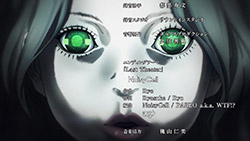 |
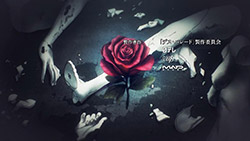 |
ED2: 「Last Theater」 by NoisyCell
Preview
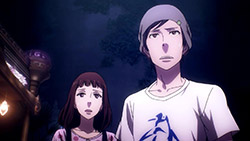 |
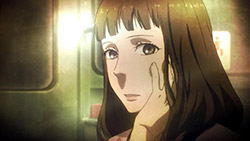 |
 |

Am I the only one who thinks “older Yuuko Kanoe” (Tasogare Otome x Amnesia) when I look No-Name?
https://randomc.net/image/Death%20Parade/Death%20Parade%20-%2002%20-%20Large%2001.jpg
Am I the only one that thinks no name is the unborn child?
https://randomc.net/image/Death%20Parade/Death%20Parade%20-%2002%20-%20Large%2026.jpg
Also, was the sex a consensual one on the women’s part? I get the implication that somehow she was date rape if it’s a one time thing. Also, she cried…
no, i dont think she is, she doesnt even resemble them, shes probably there to do some kind of born-to-do job like help them dumbass bartender to judge ppl xD
So even divine beings like arbiters can do mistakes? And here I thought only everything mortal was imperfect..
Everyone and everything make mistakes. Cells make mistakes. Atoms make mistakes.
Since these Death Parade clowns are more human than I thought, and since they all seem to have their own learning curves, I would love to be an arbiter myself. And watch humans squirm under their own sick nature.
The whole concept of eternal companionship formed by the urge to copulate / reproduce is flawed: everything becomes an ownership.
Your partner does’t cheat: he/she is boring and dispensable to the race of mankind; Your partner does cheat: he/she is a conceited sadist who deserves eternal hell. Such utter idiocy.
Mistake is something unique to beings that can think for themselves. Cells and atoms don’t make mistakes. They just follow the rules. To make mistakes requires an ability to depart from the flow.
There’s no context to say that the arbiters are divine beings. I personally think they are all humans that died while being not evil or good enough, so they are drafted into this judgement limbo. The workers in the purgatory may be judged too based on their work. There’s enough hints in the episode about dead people losing their memories to suggest that Kurokami-chan just died also.
I was wondering if there was a way to go back on the judgment if they realized that they made a mistake…
I feel bad for Machiko cause last week I thought she was just a bitch but now I see that she was a kind and caring person looking out for her husband.
Whether it was his baby or not, she cheated. One of the few things I have no tolerance for, is someone who cheats in a relationship. If she did love him, she would not have cheated.
The right choice was made.
Agreed. Its one of the worst things which happen. It ruins an awful lot.
People that have been there know what I am talking about. Truly sorry for anyone having experienced it.
P.S.
Being untrusting by nature can also make quite some heavy damage – I am still fighting it irl myself.
Cheating is awful, but does it deserve being condemned to “hell” for, especially where it appears to have been a one-time thing that Machiko seems to have regretted? People can make selfish and stupid decisions, but that does not necessarily mean that the underlying nature of that person is bad, whereas Takashi purposely playing ahead in a game knowing their lives might be at stake seems a bit more troubling…
I don’t think it deserves to be condemned to hell for, however here (at least for now) they’ve set it up where each person gets a different outcome. In this specific case, I think the scales should tip slightly in his favor.
@seltzermx
Yeah,it was at wedding day. I meant that from the begining of marriage such serious problem was lying underneath. Surely it wasn’t easy for thinking that Machiko might have married him for money because he did love her. It was just unfortunate that they never got the chance to work it out. When he said that all he wanted was family ( and how happy he was for child) and seeing him break was heartbreaking.
Even so,in my case , I am still slightly for Machiko.
Did she cheat? We don’t know if she cheated. No words in this show can be trusted. We only know someone claimed to have cheated, and that Assistant only concluded that the cheating may have happened only once.
However, how are we sure that “the right choice has been made?” If we assume simplistic stereotyped versions of “heaven” and “hell”, then yes, by your definition perhaps it has. But as many people point out, what if the concept of “hell” is actually a symbol of closure, whereas “heaven” is a continuation to learn from one’s mistakes? What if perhaps, there were edge cases where she did cheat, but according to Assistant, it was a time of temporary weakness? Should one mistake like that doom her to hell?
I see where you are coming from, but I personally believe Death Parade is written so that we can’t just ‘pass’ absolute and confident judgement like this and be done with it. I mean, we CAN, but I think that defeats the entire viewing experience, despite how personal it can get (and I’m pretty sure it will get very personal for a lot of people going forward, perhaps for me as well).
@Zanibas: I am basing my conclusion on what the show said. If she did not cheat, then the wrong choice was made.
And once again, I’m basing the conclusion on what I interpreted from the show, as the void being a “punishment”.
And yeah I agree that the judgments we’ll encounter will be very subjective and open to interpretation. Should make the show very interesting.
@Kaguya: Based on the timeline I’m inferring, he overheard those girls on his wedding day, which is when the mistrust started (though that does make him mistrusting, but to be fair, if you saw the friends of your soon-to-be significant other discussing how that person is a gold digger and has someone else, you’d at least do a double take).
Well, If an one sentence is enough… Then everything was doomed from the start. And we know Machida ‘Matchy’ Yuki was a real person from the end credits of episode 1. There was a card with the name on a table.
@seltzermx; An one more thing, he heard it before the ceremony, he said it himself. Why marring so-called ‘cheating whore’ at all if it’s the worst, please tell me? I mean, how fucking convenient to know exactly before ‘making mistake’, yet made the mistake anyway. Did he wanted to be tormented? Did he wanted to torment?
@gilraen_tinuviel:
Quite frankly we don’t know which Machi they are referring to. Could be either one. But we at least know that this one did cheat.
“Why marring so-called ‘cheating whore’ at all if it’s the worst, please tell me?”
If anything, him marrying her despite hearing this right before the wedding shows at least some small level of trust. He heard what he did, but at some level did not want to believe it. Especially since he didn’t have proof other than what he heard from her friends.
So you’re saying the show is about debating the basis or redefine the nature of right and wrong?
Even if she did cheat (and I think she did), I think it steams from doubts and mistrust that piled up,like I said already. Takashi was the one doubted her from the begining and it surely reflected how he treated her and vice verse. And when he did confort her it lead to fight and to accident. It was sad seeing them break during game and I don’t think either deserved Hell ( Hell like place of no return,eternal oblivion and so on …)
With everything shown and so many possible interpretations I don’t think it is simple as that to say that void/Hell is ultimate bad place because how many times you are going to be reborn before you commit that one bad mistake before you end in void/Hell ?
We don’t really know the circumstances of why she did what she did… it could’ve been consensual but it might not have been. Although I don’t think cheating is right either, I think you have to hear the whole story before judging someone. Unfortunately in this case, it’s up to interpretation because neither the arbiters or the audience really know what happened. I think it’s fair to make an argument either way… but you can’t generalize that all cheaters go to “hell” or “the void”.
Nameless Girl said pretty much everythg that I thought abthout Machiko. I personally thought that when talking about final destinatination show used concept from Buddhism partly because I really wanted to believe that Machiko at least got chance to end in better place.
Because if there really are only this two options with void being like real Hell with no chance of redemption then it is really cruel system both for participants like Machiko (or Takashi) who aren’t really evil,just made mistakes and for Decim who has make decision without completly understanding human nature and carrying burden of knowing that he might made bad choice.
I am glad that we got to look at that from another perspective and didn’t go over to next couple immediately 🙂
So,this means you are bloging this show ?
Yes – I am picking up this series =)
Kind of surprising how quickly some answers appeared, but it’s nice nevertheless. Should be sufficient at this stage to say the hypothesis of Buddhism being the main religious influence here is correct, the statue of Buddha shown at the beginning and the frank discussion on reincarnation/void is enough to support that idea. Although the show seems to indicate that reincarnation is good and the void is bad, there is enough ambiguity around these areas for the viewer to still come to their own conclusion regarding the nature of both areas.
What is most interesting IMO is the nameless girl. The lack of name (for the moment) and her position as an assistant seems out of place in terms of the system shown. What the girl seems to represent is a layer of sober second thought, a fail safe to promote better arbiter decision making by illuminating information possibly missed at the beginning (i.e. Decim’s failure to take emotions into account). Extending from this the girl could represent the viewer in a sense, an individual looking in with no ability to change an arbiter’s decision before it’s implemented, but an influence on how the arbiter arrives at future decisions.
Really enjoying how morally grey the show is so far styling itself as, it’s quite pleasant to currently have something not trying to simplify itself into an absolutist position of white is good and black is bad. Really hope Death Parade can keep its queer form of momentum up, there hasn’t been enough good thinking shows of late IMO.
The nameless girl – possibly an exceptionally pure soul of a deceased human?
Damn, you beat me to it Pancakes >_<. I like your idea of Assistant representing the viewer. The outside view definitely does reflect the audience in general, but perhaps not reflective of our diverse views of morality and what is 'right'. However, how Assistant was selected in the first place should shine tons of light on what she represents in the larger picture.
I love this show for how ambiguous it can be, to the point where no one interpretation in particular can be the correct interpretation. Did Decim really make the wrong call? What is the right call, if such a concept exists? Under what morals do the arbiters function when doing their job? In this world, we can trust no one, not even ourselves, to make the “right call” for how the world is, from the judged, to the arbiters, to even our fellow commentators making their own predictions.
However, I think one thing we can start speculating on is the recruitment of Assistant and having her “do what she does.” The only thing that Assistant did was speak her mind concerning the arbitration, but that alone was enough to cause Decim and Nona to reconsider their positions. Although we do not know the full details of this establishment, assuming basic psychology, we can deduce one possible conclusion as to Assistant’s true purpose, as well as her potential future.
Arbiters judge who knows how many cases, so it can be easy to become narrow-minded on potential interpretations from a bad feedback loop, given how Arbiters usually only have themselves and a few other people in the same field to assess their work. Without some sort of external force to challenge those views, I can potentially see flawed arbiters adopting a certain set of lens to see their guests, presenting who knows what problems to the system (or does it really matter?).
I can see why someone like the Assistant is important to the process–as a secondary outside voice who is not muddled and desensitized to the system, Assistant is able to challenge the views of Decim by providing a different assessment. What’s important about this though is that if we assume Assistant indeed came from ‘our’ world, her perspective is interesting as it provides a view that comes from the contemporary ethics of our world, rather than the ethics of a closed system that this afterlife seems to run on. But again, the questions is…does it really matter? Who deemed it so that a fresh perspective from humanity was important to the arbitration process? What makes one arbitration more ‘right’ than the other?
To close, there is one implication that can come from the guesswork I stated above. If it is true that Assistant is meant as a fresh voice of reason to stimulate the Arbiters, then unfortunately it seems that her job would be less than permanent. However, this was only guessed at due to the ‘three month contract’ line that was given towards the end. What happens after that time period is up (if it does pertain to Assistant) is unknown, but as time moves forward, Assistant too may fall into that trap of narrowing focus, and as such wear out her purpose.
tl;dr show is awesome, Assistant is an interesting wrench to throw into Arbitration.
I feel really bad for the wife. Don’t know if the Arbiters are qualified enough to judge these people. Decim doesn’t seem to understand humans that much, even in Death Billiards.
> Ginta Nona
Nonaginta. Means Ninety on latin. All the Arbiters have latin numbers instead of names. While other staffers just some latinm words.
Good catch on the Latin naming of the Arbiters. Nona’s in particular is quite interesting seeing as she resides on the 90th floor.
I’m liking this series now. I think it’s pretty similar Hell Girl of sort.
Let’s see if I got this right. Reincarnation: good, Void: bad, Judge: incompetent.
So all these games aren’t really neccesary and only there because, the arbiter have no better way and are needlessly cruel. I really hope this is not how real afterlife works, though the concept of a afterlife bar/hotel, like Quindecim is really cool.
Apparently, cheating is enough to send you to the void more than being the jealous paranoid person that caused the accident. I can’t help but feel there’s something wrong with that…
I haven’t seen the original movie, but who’s to say that both people can’t end up in the void or reincarnated? Can that happen? >_>
Ok , so arbiters CAN make mistakes … this changes a lot of things
who nameless woman is and why she is here is an interesting point
also we still don’t have a solid understanding of which is better , void or reincarnation , and why can’t both individuals end up with the same fate ?
one must be good and the other must be bad ?
how about both good ? or both bad ?
ahhhhhhh… waiting for more eps ……
Since they are the arbiters of the afterlife, I feel like they should know automatically whether people are lying or not since they’re making important decisions as to who gets reincarnated and who gets put into the void.
well , in order to understand arbiters more we need to understand the place they are in , how they got there and who is in charge
then we can understand their capabilities , if their judgment is the best that one can take or not
and are both elevators too small for 2 people to fit in or what ?
”Oops, I made a mistake.” Sucks to be you.
I got some answers but ended up with even more questions after this episode.
Well, for now all of it feels like an unnecessary cruel joke of somebody (who? gods?), who uses an other beings (shinigami?) for manipulating, coercing, pitting people against each other to the point of them feeling like a cornered animal therefore showing their the worst behaviours. And after that the mysterious beings have to judge these people by their feelings, motives and behaviours while not understand them. Mr. Jigsaw, is that you?
If is it Buddhism is really necessary to play games? I mean all religions have very detailed rules how to judge people before their death and/or omnipotent beings, who will know, where a person should go.
I thought about atheists for an one minute but as the atheist myself I’m not afraid any void and not to exist. Actually, any of these paths wouldn’t be a punishment itself to me, because I’m NOT a cynic too.
Is there will be situations where an arbiter won’t be able say, where an each of person has to go? Is there will be questioning a whole system, which for now lacks? Will arbiters learn something too?
It Death Parade is really so morally ambiguous and complex as people say? Well, I don’t think so, most of religions has much more complicated rules people can be judged by. This extreme dichotomy, where an arbiter has to choose only between two answers (on shaky ground too), makes a call for extreme people’s behaviours out of necessity. Like Machiko & Takashi’s case. Here we have a whole madonna-whore complex, so the cheating wife has to sacrifice herself for husband’s sake to being forgiven (and in eyes of many very little too) and the husband not only has to behave as a paranoid douchebag, who in the game’s time thinks only for himself, but has to be degraded to a furious drooling animal, which an only intention is to kill. Is that for you really complex or ambivalent?
Actually I feel cheated and stupid at the same time (now that’s complex!). Because the whole thing, Death Parade episode 1 or Death Billiard, doesn’t matter, is ambiguous not because it’s morally complex, but only because lack of certain informations. Behind the mystery is nothing. And I feel really stupid because I let myself be cheated by the gimmick. Of course whole thing is still entertaining (and I watched OP hundred times till now) but there won’t be pointless intellectual odes from me.
Of course, because it is only episode 2, it still has a chance to redeem itself. For example, it will make various arbiters doubt themselves or the system. And I really hope there will be at last one episode, where a pair will cooperate completely and show their goodwill only. I will feel weird and uncomfortable if the anime pretends to being ambitious and intellectual only because shows cynical’s point of view as so-called the truth about people and world. It would feel as a secret masturbation fantasy of teenagers, who think they are smarty-pants and being cynical is cool and edgy. I’m just too old tor that kind of masturbation session.
Death Parade’s greatest strength – its relentless focus on its characters and their respective stories – is also its greatest weakness, one which nearly cuts itself off at the knees.
As I said before, the series seems to take an almost lighthearted view of death and its consequences, a notion which this episode only served to emphasize. How else do you explain Decim’s charming incompetence when it comes to determining his respective judgments? Surely Arbiters (or potential Arbiters, as Nameless Girl likely is) should have a standard to meet before being left to their own devices.
Now yes, one could effectively argue that aforementioned incompetence is precisely the reason why Assistants exist, to give a counterbalance to Arbiters in cases like this one. All well and good, except that two souls likely came at the expense of showcasing that very need. And who knows how many times this process has repeated itself? Are human souls really that cheap in the grander scheme of things in Death Parade?
And as if all that weren’t enough, there’s also the inescapable reality of all people eventually meeting their dreary fates in the *BUM* *BUM* *BUM* void, a concept which only serves to reemphasize just how little value people have in Death Parade, whether they’re reincarnated or not.
So really, if the series is going to take that dreary an outlook on humans, why should I give much a f*** about them either?
This is exactly what I mean when I say that the series’ greatest strength, its focus on its characters, ultimately trips it up and has it fall flat on its face.
Much as I enjoy the concept, Death Parade falls in line with a slew of other series that tries to come off as more profound than it actually is. Really, what is this series trying to tell me? What’s the message here? And if there none, am I left to believe that this just some sadist’s entertainment at the expense of countless humans floundering about before their inevitable demise?
*sigh*
I won’t say there isn’t time for things to turn around, but it’s a damn small window that’s closing fast. It’s got about two more episodes worth of patience before it can consider itself dropped.
Judging by the previews, next episode is another game. Bowling this time. Can’t wait for this.
https://randomc.net/image/Death%20Parade/Death%20Parade%20-%2002%20-%20Large%20Preview%2001.jpg
Can’t wait for the next pair’s mental break down.
Thanks for blogging this, Cherrie! I hope you stick with it!
Same here! Great job as always!
Thank you for reading =)
Yes I’ll be blogging Death Parade this season.
Let me spell it out for you. The Void is eternal darkness. Souls that go there are lost in eternal darkness. If I was a soul I would not want to be lost in eternal darkness. Reincarnation is a return to the physical world. It might not be the best, but at least it is something. The Void = nothingness.
I honestly believe that reincarnation is just another term for searching for enlightenment. Perhaps in Takashi’s next life he will learn to trust people more and not come to false accusations about others. It seems like it gives him another chance to make a change in himself.
As for Machiko, I want to believe she lived life to her fullest where she didn’t need to be enlightened anymore. It seems she made a self-sacrifice to go to “Hell” for Takashi so he can be saved from eternal damnation. It also showed that she is a selfless person when it comes to her love. Even though she committed adultery, she truly loved him and nothing would change that.
What’s the point of reaching so-called “enlightenment” if you’re just going to be thrown into the void eventually anyway?
Okay, I think you’re missing something here. The ultimate goal of Buddhism isn’t immortality – it’s freedom from the cycle of life and death. Every life is a chance for the soul to achieve enlightenment, but every additional life is also a opportunity for suffering. As a result, Buddhism teaches that the goal of the cycle of Reincarnation is to eventually ESCAPE the need to be re-incarnated. You and I are both likely approaching this from a Judeo-Christian perspective, so we see the two fates as “A chance to live again” and “Eternal Damnation”, but Buddhists would see the two fates as “Another chance to reach enlightenment” and “Escaping the Cycle of Reincarnation.” Neither fate is a as bad you probably think it is.
Everyone seems to forget that Takashi jealously was understandable since he had a reason to believe Machiko cheat and she DID so she deserved the “Void elevator” more than he did, but that assuming that each person must ride a different elevator, i wonder if its forbidden to put both persons in a single one. Honestly i dont think neither Machiko nor Takashi deserve it but if one must go it had to be Machiko.
Also, when they were discussing the two path that a soul can take, they described being sent to the void as “getting lost in darkness” or something like that so its definetely a worst place than our world.
Most likely though, Machiko never would have cheated if Takashi hadn’t become so suspicious and petty towards her. Before they were married, according to the flashbacks, it looks like they really were happy and the ending even had a wedding guest card with the name “Machida Yuki” (aka, the “Matchy” Machiko and the two gossipers talked about). However, instead of talking to Machiko about things he let it bubble up (not to mention, considering how he acted towards her in the game before they even got their memories back) and it ultimately culminated into his jealousy killing them. “Understandable”, yes. “Right” or “justified” is something else entirely.
While Machiko didn’t do the right thing by cheating, between them two of them I fail to see why her sin alone is enough to damn her in comparison to Takashi’s.
Somehow, the series that does the best here in RC are the ones that generates the most discussions in the comments (whether it sense [actual questions of life] or not [flame-wars])
That being observed (or not), this series might be worth binge watch later…
OR you can just watch it now and discuss with us =)
Yup, I was certain Machiko put on that act to give him peace of mind and I was right, woot!
It’s good that these aren’t perfect beings, considering they aren’t human they have a difficult time being able to relate to the human condition as a result. Nameless girl helps Decim consider these things he does not put into perspective, intent.
While I do not condone cheating, I found that Machiko proved to just be a more morally pure individual and ought to have get, what I perceive to be, the better route than her husband. He become awfully spiteful in the end and while he does have right to be angry with Machiko you’ve got to put their entire personality into perspective when it comes to sorting out their fates in the afterlife. A remorseful cheater definitely beats a spiteful man incapable of ever being trusting or level headed imo.
Firstly, I can’t wait for them to introduce the rest of the cast. The voice casting is great and these people have been in a bunch of great anime which aired only not long ago last year, I think Clavis (the elevator boy) is going to be a huge hit as a character; I instantly liked him the moment I looked at him!
Growing up in a Buddhist community, I am definitely convinced that the religion of choice here is definitely circling Buddhism:
– Lotus flowers are a huge sacred symbolism within the religion, also, the OP and one of the characters (the old man with pink hair) has showed lotus flowers (blooming and petals) if you observed closely
– 15th floor, granted we don’t know how many exact floors there are, the Buddhism side does touch upon the 18 levels of hell. Decim himself, is only one of the arbiters in charge of a floor, we can assume there are other floors where other arbiters are in charge of
I don’t know if the arbiters themselves are equivalent to a god-like status, but it does prove that they may make mistakes (and these mistakes are costly because they’re irreversible). The nameless girl doesn’t seem to be of the similar descent, and therefore is able to understand the unpredictable human nature well (she’s likely to be human descent).
I liked this ep. While it was a recap, it brings up a lot of interesting questions about the world and the Arbiter system. The Arbiters being capable of making mistakes, in particular, is a nice touch that ups the stakes and brings to mind questions of subjectivity. Since while Decim made a mistake about the wife, Nona thought the Nameless Woman made a mistake about her assessment on the husband. With this in mind, how are people usually judged to begin with if their not sent to that space? Why set up a system like this – complete with different floors and presumably bars – in the first place?
Also, the book Nona was reading is interesting. In the opening, we see a flash of that book and the Nameless Woman holding two dolls of children. These dolls also appear on the cover of the book, so it seems fair to say the book and the dolls mean something to the overall series or the Nameless Woman’s story.
I agree with observations that if Death Parade’s world is drawing from anything it seems to be Buddhism. With this in mind, you have to wonder more about the Void. Lots of theories were around of the Void not being a terrible place but this episode made it clear reincarnation=good and Void=Bad. If the Nameless Woman was a human, you have to wonder how she got that position in the first place or if she got reincarnated into it or something.
I quite enjoyed the 2nd episode more than the 1st probably bec I have seen the mirai short already. Don’t get me wrong, episode 1 wasn’t bad, it was necessary for the new viewers, but it was too similar to Death Billiards for me. Anyway, I’m glad they are focusing on the staff much as the people being judged. That seems like it has much more potential long term.
Same. I remember some people were complaining about the second episode recapping things from another POV but I disagree. I think while this show could technically have been episodic and been able different explorations of the games I think that’d where itself down when there’s so much questions in the world and the staff. Plus, just introducing the possibility of Decim being able to make mistakes already sets him up for his own character arc, as well as the question of who the Nameless Woman is exactly.
I could easily see the “games” being used as a way to flesh out everything else, though the question is in how they’ll balance the game/people to be judged with the Arbiters’ plots. Death Billiards and episode 1 put a lot of focus on the people to be judged and that set a lot of the emotional tone and pacing. Episode 2 offered a completely different tone and, while informative, I can’t see the show alternating between an episode for the game and an episode of the background.
Something that’s a plus about Death Parade, they leave hints lying all over the place and they really want you to look at them (they’re not even in the least subtle, it’s BAM in your face). It seems to be that way since Ep 1 (heck the OP and ED), the camera or character will pan in onto something for at least 5 seconds or less.
So the one responsible for their deaths gets a 2nd chance at life? How is that fair?
I agree, it’s not fair since it’s implied that Decim made the “wrong call”. However, life isn’t fair and I guess the afterlife isn’t either.
Kind of bummed out I was right about where Machiko ended up. Especially now that more light was shown on the entire situation. Would have been nice if both Machiko and her husband were sent for reincarnation. She made a mistake (potentially only 1 mistake which has been concluded by the Nameless Girl). It’s not like she intentionally went and harmed a bunch of people.
Questions that came to me were, “Wouldn’t they eventually run out of human souls to reincarnate in this system?” and, “If they would need to newly create more souls to fill the next generation of humans, why throw souls away into the void in the first place?”
My not-too-deeply-thought-out theory is as follows:
The human population as a whole has been increasing for a long time now. So, new human souls had to be created to fill the increasing number of human bodies being born. However, it was realized that this population growth trend will not last forever and will eventually have to reverse. There is the very real possibility that the human population may decrease quite drastically in a short amount of time. What to do with the huge backlog of souls in that future scenario?
Well, start building a system of judgement for which souls to keep and which to throw away, of course. Sure, just choosing the souls at random would seem to work as well, but apparently whoever is in charge places some value in the moral quality of each soul or something. *handwaves*
Anyway, it would take time to train enough staff to be good judges of character, and the population is not exactly declining yet. So, only a fraction of the souls that died (based on arbitrary criteria such as shared time of death) will be used to train the staff in making these decisions. Judgements are at a very slow pace right now, but these trained staffers will eventually get really busy once the apocalyp-*ahem* decline in overall population starts happening.
Also, the recentness of the setup of this system would explain why the setting is so modern.
Thoughts from anyone else?
Also Cherrie, thanks for blogging this!
My thoughts on Death Parade:
Love the OP. Both the music itself and the animation.
Played episode 1 for my younger sister just to show her the OP (since I assumed she wouldn’t be interested in this type of show), but she shoved my hand away to continue watching the rest of the episode. She proceeded to also watch episode 2.
Sister: “I can’t wait to see them play DDR!”
Me: “DDR is not one of the death games.”
Sister: “Well, it should be!”
Death Parade is not purely episodic, what a relief.
I think Decim made the right choice. Takashi was kept in the dark for the majority of his marriage which chipped away at his soul until it broke at the end. Michiko on the other hand was corrupted but was attempting to heal, however she never discussed her affairs with her husband so it could truly never heal. Takashi was comforting and worried about his wife, but that worry turned into jealousy the longer Michiko kept him in the dark.
That scene that flashed with another man in her bed is proof that she was cheating, whether it was for revenge for Takashi being suspicious or personal affairs is unknown. The fact is she went to that man and not Takashi is a strong nail in the coffin. Even if she regretted it, she never spoke of it until the end.
Takashi had a chance to confront her about it, but trusted her enough to hold off on doing so until the breaking point. It ate at him constantly, refusing to give him the life he yearned for.
Michiko had a chance to confront his suspicion but never did. She appears to be occupied with something else.
So, my vote goes for Takashi getting reincarnated.
Now here’s the part were things get a little different, it has to do with the arbiters.
Nona makes a remark regarding Takashi’s mistrust of people.
Earlier, Clavis, the elevator boy, makes a remark about Nona and Newbie. Here, we see that Nona takes back what she said and says that Newbie has a long way to go. This is proof that Nona has her own way of judging people, and will sometimes do it without thinking as evident with her “what?” when Clavis says she usually never goes easy on people.
Newbie believes all of this could have been avoided, but is siding with Michiko for the most part.
Decim believes he might have made a mistake due to Newbie’s input.
Nona doesn’t confirm or deny Decim’s mistake. However, she mentions that people make mistakes. She also tells him that people can display emotions differently and that he shouldn’t ignore it.
I’m assuming the reason Newbie is here is to help Decim become a better arbiter. Right now, we know that:
1: Decim is unable to relate with the emotions of humanity as shown in Death Billiards.
2: Newbie is able to read people’s emotions, but not deep enough yet.
3: Nona is judgmental and somewhat bossy, and her views on the Takashi and Michiko appears to clash with Newbie’s.
Newbie will be providing Decim the “humanity” he needs to make better judgements.
Newbie might change Nona’s judgements about others or vice versa.
This anime is pretty unique. It’s able to spark a debate based on our beliefs, but at the same time introduce characters with different quirks and judgement.
The interaction between the arbiters may cause some great character shifts which will affect the final judgement.
I fail to see how he was kept in dark and trusted her enough not to talk about it. Because of some snippet of conversation about Matchy he immediately went to doubting Machiko. It ate him,that is sure, and since he still married he surely hoped for the best but he never conforted her about his doubts and Machiko couldn’ have since she never knew. It would have solved a lot of problems if Takashi asked earlier about if she was ” Matchy”
As for cheating, I already said that I believe it was part because how Takashi might have treated her. They both had choice of conforting each but they didn’t.
Takashi did love her and it was hard for him but he was the one doubted and never conforted her (especially about wheather she was “Matchy” ). I think why he never talked about it was fear of her not loving him, not trust.
Wow……this is becoming one of my absolute favorites amongst all the shows airing this season. The story is good, the world building is nice, plus the characters the the OP are freaking AWESOME!
Does this episode’s post mean it will be blogged weekly? I love reading about everyone’s take and interpenetration of each episode.
Yes – I’m picking it up.
There are a lot of interesting views that go into this episode, and I like that they’re giving context in a way that makes sense for both the characters and the audience. Its exposition done right. I also like how sosphisticated the system really is, even if, due to there being a living element in the judgements, it is pretty flawed. It’s a unique take on a judgement system, and it works great to make the contestants provide as much info as possible without a questionaire.
It’s been touched up above, but I do feel we can’t accurately judge either Takashi or Michiko for their actions while alive. The problem is that we only really know as much as Decim does (possibly less), and that’s a smattering of imagery without context – there’s a reason that the judgement also comes from their actions in the game which, as Nona pointed out, is more reliable than a scattershot of memories.
We know that Michiko had sex with another man, but we don’t know the circumstances, the reasons nor frequency; this could be a rape, a lapse in judgement, or perhaps some kind of revenge against Takashi. It ended with her crying in the flashback, however, and the only time that she comes close to revelling in the act is at the end when she claims that she was marrying Takashi for his money, which is dubious for a number of reasons brought up in the show. She made a selfish decision; that much is clear. We also see her on her cellphone a few times, but we don’t know if this is from her lover, a friend, or just her texting at inoppertune times – we don’t have the context for those scenes, just as we don’t have context for the flashbacks in bed save for that they happened.
We also know that Takashi caused the car crash due to his distrust, and we also know that he became distrustful after overhearing the girls at the wedding. Takashi’s suspicions were right…but only by hearing some girls gossiping about “Michi”. Though his wife’s name is Michiko, Michiko herself provides a plausible and reasonable explenation as to who “Michi” would be – this is further problematic in that there are other japanese names that have “Michi” in them, and other people named “Michiko” even if he was correct in what they meant. Takashi had no proof beyond some questionable texting times and a mere snippit of overheard gossip about “Michi”. He never asked her about it either, instead confronting her at the worst time he could have save on the altar. This may be something of a culture difference, though, so things could be a bit skewed there.
There are a few important hints that come with and without their memories though. We know that both of them had love for one another, as they immediately went to one another as soon as the elevator doors opened – they were concerned for one another and where they were, not for their material possessions. However, after their initial confrontation on the gossip, where Michiko gives the plausible story about her friend, Takashi seems to be at rest, forgives Michiko and looks forward to being a father…until he regains more memories from his past, remembers the resentment, and completely forgets the statement that Michiko had given him despite only remembering events that came after the initial snippit (and before). Nona made a good point – Takashi was distrustful by nature. Once given a new (or rather, old) set of suspicions, he goes and continues to confront Michiko, and deliberately puts himself ahead in the game despite the fact that it’s related to them living and dying. He further interferes with Michiko’s final throw, which ironically makes her win.
Did Decim make the right call? I have no idea, but (on the assumption that reincarnation means new life and being cast into the void means losing oneself completely and no new life) then I’m tilting towards wrong. The reason for that is that, circumstances in life be damned, their reactions to these circumstances paint Takashi in a very negative light. Michiko made a selfish decision, a mistake that put her relationship in jeapordy. Takashi, meanwhile, confronts her again and again and does not trust her, and let his assumptions rule out – what’s worse is that, again, he lets himself use those assumptions to justify making himself come out on top. I agree with Nona; while Takashi did love Michiko, the moment he got suspicions he stuck with them, no matter what Michiko said. He never caught Michiko in the act, he was just right by coincidence. Michiko made a mistake she shows regret over, but Takashi was the one who drove the divide between them, both in death and in spirit, and he does not apologize for it. A wrong from a suspected wrong (even if correct) does not make a right.
Michiko -> Machiko
Michi -> Macchi (the double-c is not a typo)
Great run-down on what happened. I agree with your analysis, especially your last sentence.
Ah yes, thank you. It was late when I posted that, and a while after I’d seen the episode. I was stuck on names, and I found “Michiko”, so I thought that was the right name since it matched my memory somewhat (I nearly called Takashi “Takeshi” throughout it). I’m glad you liked the analysis – I was a bit tired of people condemning Machiko simply for the fact she cheated, but I didn’t want to come off as pinning the blame solely on Takashi for what happened. Unless we revisit this case again at some point, or its referenced, we just won’t know…and I kind of like that.
Nothing’s cut and dry thus far (we don’t even know if the void or reincarnation is punishment in the context of the show). It’s something that reaches across cultural barriers, and the responses you get are as telling as towards that culture.
Excluding second seasons, this is my favorite by far. I like the discussions about the events & themes in this anime.
Personally I like that the arbiters aren’t perfect in their dictation. That makes things all the more interesting.
https://randomc.net/image/Death%20Parade/Death%20Parade%20-%2002%20-%20Large%2036.jpg
…is that Storybook written by Klaus Poppe A.K.A. Franz Bonaparta? The art reminds me of The Nameless Monster.
I was wondering if that book had any significance.
I wanted to comment on the book, but couldn’t actually find any background or reference towards it. I’m sure it’s going to brought up again later on but for the time being, je ne sais pas T_T
Is there any ambiguity on reincarnation or the void in this show? The void is represented with a devil mask, characterized as Hell and is said to be a vast darkness into which a soul is dropped. Until we receive some positive imagery of the void, I think we can easily say that it isn’t the elevator that most would want to ride.
So far the situation seems to be:
1: One of the judged must be sent to the void while the other sent for reincarnation.
2: Arbiters are used to judge which soul is sent in either direction.
3: These arbiters are not omniscient nor infallible.
The primary problem, and seemingly the central conflict of the show, is the resolution of point three. The arbiters have a moral imperative to be correct in their judgements. Those souls that are sent to the void are seemingly lost forever. Damnation for eternity. We can argue if an absolute moral standard can ever be achieved by these arbiters but the consequence of their decisions dictate that they must strive for such a standard.
PS: That does appear to be Buddha on a lotus flower. The lotus is symbolises purity and divine rebirth. Raising above our sin as a lotus flower raises above the murk of the water. A good symbol for a place that judges who should rise from the mud of their past life.
That OP though, it’s amazing!